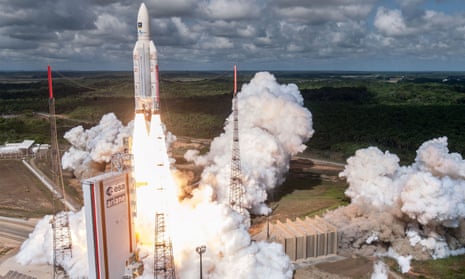Plans for commercial spaceports outlined in the Queen’s speech this week will not cancel out the economic threat of Brexit, industry leaders have warned.
The space industry bill would enable rocket launches from British soil and ease regulations to make it possible for startups to send constellations of cheap micro-satellites into orbit.
The proposed legislation, which aims to increase the UK share of the global space economy from 6.5% today to 10% by 2030, has been broadly welcomed by the space industry. However, senior figures said the government’s ambition could be jeopardised by the impact of Brexit.
Restrictions on the movement of scientists and engineers, more onerous bureaucracy in the supply chain and being frozen out of lucrative EU space contracts could all be highly damaging and some companies are already shifting work out of the UK as a result.
“The bill certainly doesn’t cancel out the concerns that we’ve got, and these are very big concerns,” said Richard Peckham, chair of the trade body UK Space.
“Staff mobility and supply chain are a massive issue for us,” he added. “Any kind of bureaucracy at borders is quite frightening. We’ll be asking, is Britain still the place to work in this industry?” Does it make sense to do business here?
Companies based in the UK also face being excluded from major new European space contracts for the latest phase of work on the €10bn Galileo satellite navigation system. A new clause introduced into the latest tender documents states that contracts will become void if a supplier is no longer based in an EU member state and that the supplier would be required to meet the financial burden of finding a replacement.
As a result, companies with UK headquarters stand to lose out on deals worth hundreds of millions of euros.
Stuart Martin, CEO of the Satellite Applications Catapult in Oxfordshire, said: “There are some big contracts coming up where this is in play. You can see why British companies are baulking at that and seeing it as a deterrent to bidding. I know that there are companies that have made that decision [not to bid] or to bid through European subsidiaries.”
Peckham, who is also a director at Airbus, said that the situation could have been avoided if the government had voiced an intention to “buy in” to the Galileo programme – as Norway and Switzerland do – on leaving the EU.
“The way Brexit is being negotiated, the UK government has made no indication that it even wants to stay in the programmes,” he said.
In the Queen’s speech, the government laid out plans to bolster the UK’s £13.7bn space industry, which has been growing at about 10% each year over the past decade.
Much of the growth has centred on new applications for data collected by satellites, which are becoming smaller and cheaper, in line with the dramatic increase in processing power of computers. While launching satellites was once the preserve of governments and a handful of big industry players, there is a rapidly growing market of startups launching small, cheap satellites for a vast range of on-the-ground applications, from providing updates on buses and train arrival times, to monitoring the health of elderly people and internet provision in remote areas.
However, a sticking point is that companies still have to piggy-back on major state-sponsored rocket launches to send the satellites into space.
“In the past these small satellites were basically toys for universities to play around with and it didn’t really matter if the launch slipped for six months,” said Peckham. “As they’re starting to become more serious businesses, you need to be able to buy a launch because you have customers who are expecting to have data.”
The new bill will pave the way for new commercial space launches from the UK – and small satellites, rather than space tourism, are expected to be the initial focus. Previous feasibility studies have already identified a number of potential locations for spaceports, including sites in Cornwall and the north of Scotland.
The bill is also expected to amend rules around liability, which currently require companies to take out third party insurance of $60m per object, to cover against the possible damage caused if the satellite crashed into another object in space. The current regulations were designed for very large, expensive satellites, but companies are moving towards launching constellations of tens or hundreds of small satellites.
Joanne Wheeler, an expert in space law at Bird & Bird, said: “At the moment the model just doesn’t work. If you want to launch 1,000 satellites that insurance isn’t available at the moment.”
The new bill is expected to address this by allowing companies to insure an entire fleet of satellites.

Comments (…)
Sign in or create your Guardian account to join the discussion